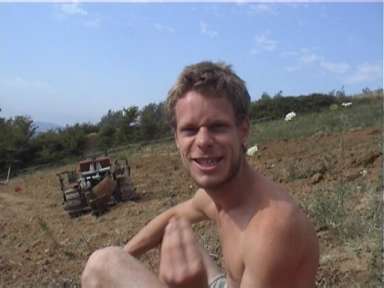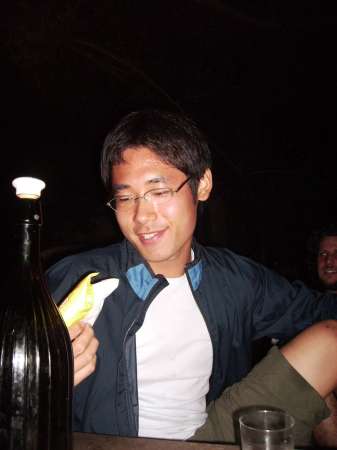
Wwoofers

Se il posto dove abitiamo ha ora questa fisionomia è grazie anche a tutte le persone che con noi hanno condiviso parte del loro tempo, anche tre mesi, aiutandoci nei vari lavori, anche di ristrutturazione.
Facciamo parte dell’associazione internazionale Wwoof formata per la maggior parte di studenti che hanno deciso di prestare il loro aiuto gratuitamente in cambio di vitto e alloggio (ma non solo) in piccole fattorie biologiche.
Arrivano persone da tutto il mondo motivate ed interessate ad un tipo di vita diversa. Con quasi tutti abbiamo stretto legami di amicizia e ancora ci teniamo in contatto, con alcuni ci siamo anche rivisti, quando europei.
I nostri figli sono sempre in prima linea, coinvolti e operosi, apprezzano e sostengono le, ormai nostre, scelte.
La vita in campagna richiede in alcuni periodi la concentrazione di manodopera per eseguire alcuni semplici lavori. La vendemmia, la raccolta dello zafferano, delle olive e della legna: se fatti in tanti non pesano, anzi si parla si ride si scherza. S’impara un po’ d’inglese o un po’ d’italiano a secondo della provenienza. Ci sono momenti di cultura, quella vera alla Don Milani.
Quante sere abbiamo aperto atlanti, confrontato, misurato, mangiato e bevuto…
Finendo vi cito un pezzo di introduzione di un libro che ha sempre ben riassunto il pensiero mio e di mia moglie, nell’educazione dei nostri figli, sull’importanza dei ragazzi che “fanno” con adulti.
“I ragazzi sono naturalmente attratti dall’osservazione del lavoro umano e delle attività dei mestieri tradizionali in cui il nesso tra ciò che si fa e i risultati che si ottengono è facile da capire. Per i ragazzi, conoscere le attività lavorative, è un modo di conoscere non astrattamente come viviamo, ma come è fatto il nostro mondo. Tutto ciò contribuisce allo sviluppo non soltanto cognitivo, ma anche affettivo della socialità. Basti pensare al valore che ha ogni attività che induca il ragazzo a comunicare con altri, a fare assieme. ”


Qui di seguito il testo di presentazione della nostra azienda-famiglia che appare in internet per i ragazzi che devono scegliere tra le tante aziende, chi contattare per fare l’esperienza –soggiorno:
Famiglia vegetariana 4 persone (figli 19 e 16) conduce Azienda Agrobio con agriturismo. Produciamo, in 5 ettari, olio, miele, vino, succhi di frutta, marmellate, dado vegetale, formaggio, erbe officinali, ortaggi (per nostro consumo), uova, olive in salamoia. Abbiamo animali tranquilli: cani, gatti, 5 pecore, galline e api. Utilizziamo per il nostro lavoro una cucina-laboratorio e un lab. di falegnameria. Facciamo spesso pane e pizze nel forno a legna. Bosco vicino a casa, completamente isolati a solo 2 km dal borgo medioevale di Città della Pieve. I nostri pasti (vegetariani) sono in buona parte bio e auto prodotti, la durata del soggiorno è da concordare, anche più di un mese. Alloggio in tenda (estate), appartamento agriturismo se non affittato o in casa. Lingue parlate:poco inglese e poco francese.
Ecco una entusiasta testimonianza (in inglese) di Annie:
Annie Myers
Brooklyn, NY
WWOOFer, Fall 2004Cimbolello originally attracted me on the WWOOF list of farms for reasons practical and essentially simple: I wanted to be in Umbria because of a previous year spent studying in nearby Lazio, five hectares didn’t seem too big, the family included two kids about my age, and the presence of fresh wine and olive oil was a plus. Granted, these details were all true, but I could never have known what a gorgeous, marvellous place I had chosen.
I have been here for about two and a half months, September to November 2004, and helped Cesco, Luisa, Nico, and Seba: bottling and labelling last year’s wine, completing the October grape harvest, making the quince-mosto jam typical of this area, harvesting the olives all November, and tasting the fresh new olive oil. I am here beginning a year off before going to college, in which I wanted to learn, far away from a classroom (or an office), and wanted to improve my Italian. That was it – I had no experience in agriculture, no idea what the work would involve, and no idea if my 5’3”, 18-yr-old self would rise to the challenge. Yet I came, and it’s honestly been fabulous. I don’t know how I’m going to leave.
The Cordone family is made for taking in guests and letting them become a part of their life – Luisa is a kindergarten teacher, and Cesco has experience in furniture-making and restoration, bricklaying, and obviously, particularly since they moved here, agriculture. Five years ago, already with two kids, the family decided that life on a farm was the life they wanted to lead, and they’re refreshingly satisfied with what they’ve established here. They have learned about the land and their farming methods by word of mouth in the town, through friends and acquaintances, myths and rumours, and are so endlessly excited in both their success and true interest in farming that they become like good professors that can’t help but excite you and make you want to listen as they ramble on, explaining all the different details and idiosyncrasies, philosophies and ideals, of biological farming, selling biological products, and just of their lives in general.
I have picked the grapes and olives with my own hands, seen every step from the vine to the bottle, and from the olive grove to the press to the bruschetta with our first oil of the year. I will miss the sheep giving birth, and the cheese they will make, but I’ve learned about the bees (just in talking, picking olives), and tasted their honey. I’ve sliced piles of apples, pears, and quince for the jams Luisa makes all summer and into the fall, and made fresh pizza and pasta with Nico using fresh eggs from Seba’s precious chickens. I could never have imagined anything like it. The farm looks out on Tuscany, land and colors you’ve only seen on postcards – it’s the most beautiful place I’ve ever been, and not yet (at least in the fall) full of tourists, but full of people that live here because they love it. I have been living in what seems a day of people-watching, listening to, meeting, the Germans that moved here twenty years ago and started their own community, the Swiss couple that sells bicycles, the South-American woman and her French husband whose house Cesco helped build, the English gypsy who played at a market in Florence, the photographer in town who’s gotten accustomed to my regularly delivered rolls of film. People I have met and talked to, listened to, learned from…the list goes on and on. And my Italian has improved in the best possible environment: with a family that speaks correctly (rare) and barely a word of English in months.
Like many small Italian towns, Città della Pieve is antique and adorable, packed with history and natives sitting outside the cafés and walking the little streets. The five-minute drive, half-hour walk, up to the town from the farm shouldn’t worry – for one thing, it’s a beautiful walk, but someone can almost always give you a ride and there are buses that pass nearby going to Perugia, Assisi, and wherever you might want to go in your free time.
So…it’s been perfect, all I could have asked for, and I feel as though I’ve lived another life for two months. Even if you have just a week or two, to put it simply, you should come!